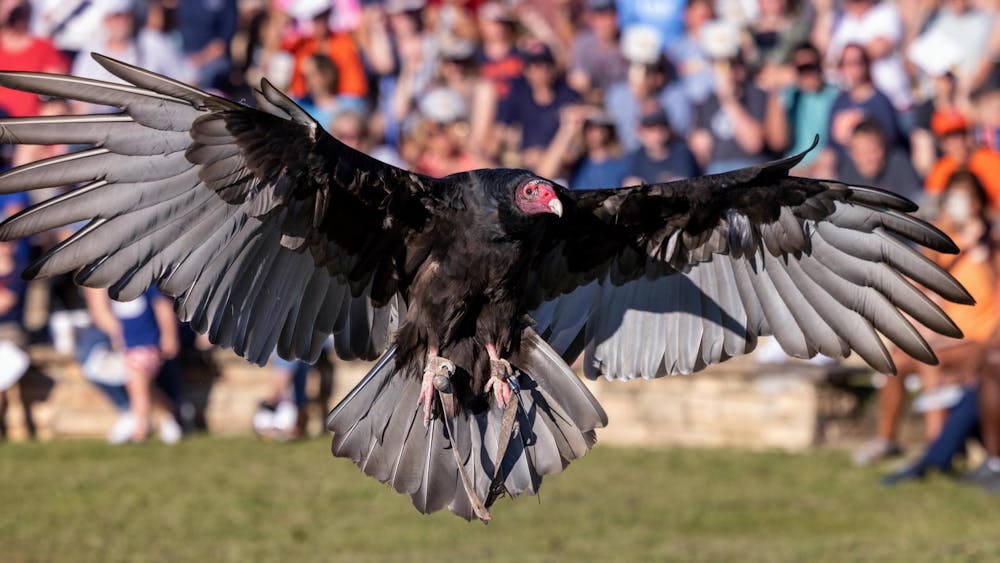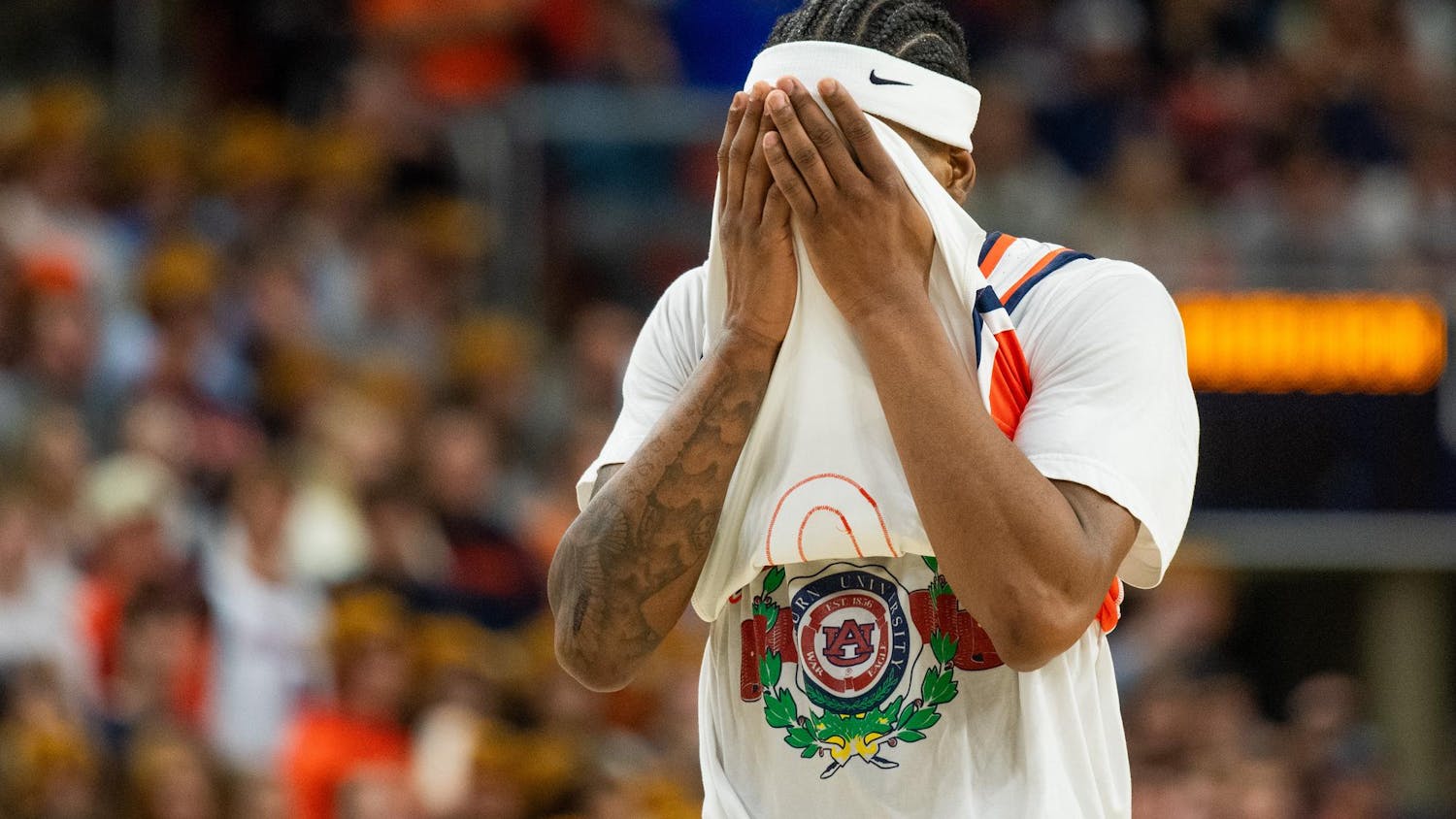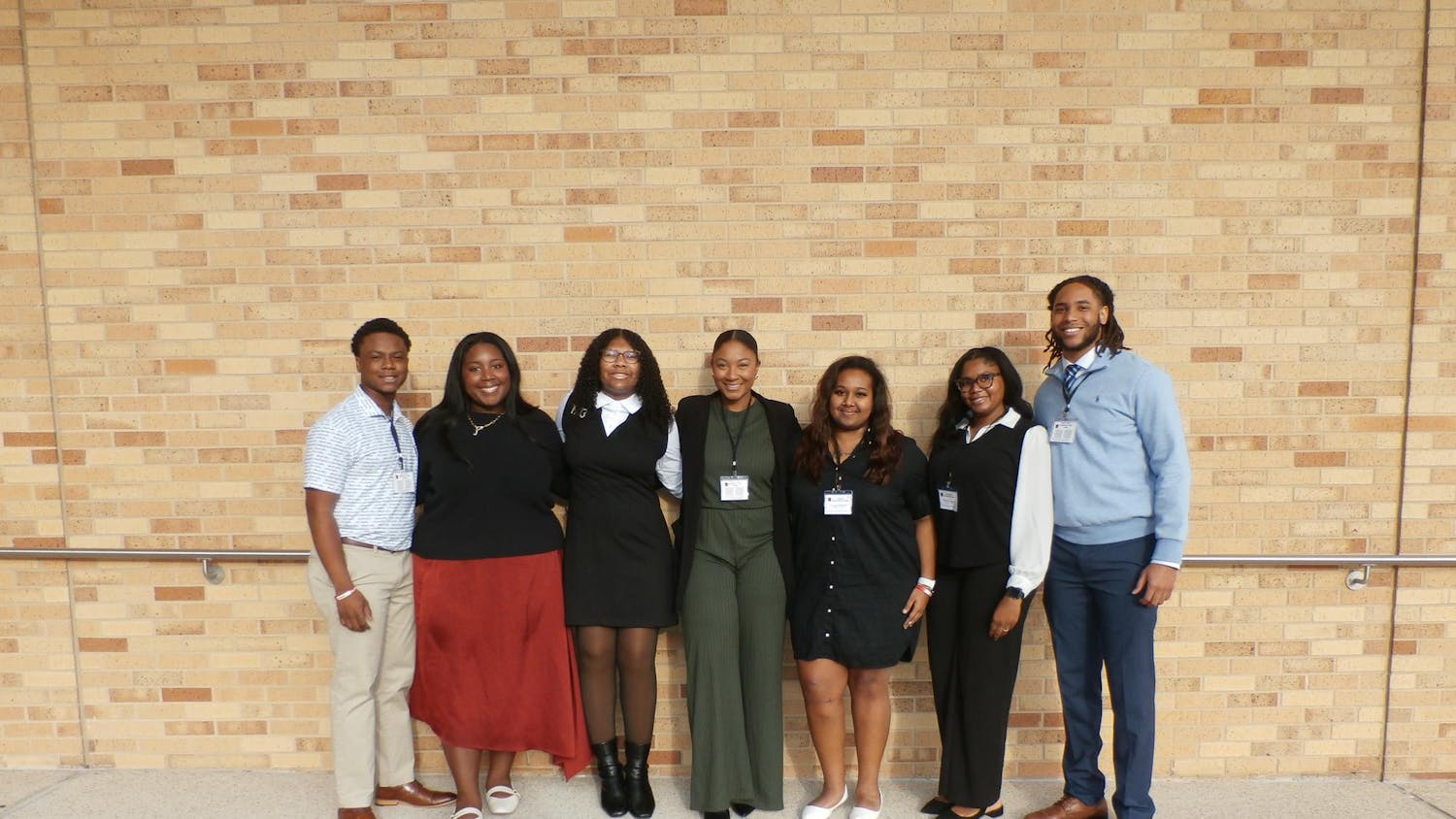Soaring throughout the air at the Edgar B. Carter Amphitheater, falcons, hawks and eagles educate attendees at the Football, Fans and Feathers program. Hosted by the Auburn University Raptor Center, the birds and their other feathered counterparts entertain and teach visitors about the importance of animal rehabilitation.
The Football, Fans and Feather program occurs every Friday before an Auburn Tigers home football game at 4:00 p.m. and costs eight dollars to attend.
The educational program is an hour-long presentation that showcases raptors that fly down to greet the audience. Visitors get a chance to learn about the conservation, rehabilitation and overall history of the raptors. All of the animals featured in the show are permanent residents of the center who would not survive otherwise in the wild.
The birds showcased at the center have different activity patterns based on their respective sleeping patterns. Nocturnal birds are active throughout the night and sleep during the day, while diurnal birds are active during the day and rest at night.
Among the nocturnal birds, the Barred Owl and Barn Owl are featured, while the diurnal birds include hawks, falcons, and eagles. The hawks featured include the Red-shoulder hawk, Red-tailed hawk and the Broad-winged hawk.
Later in the show, handlers introduced the American Kestrel, a diurnal falcon that has faced recent population decline possibly due to loss of nesting habitats, Peregrine falcons, Aplomado falcons, Turkey vultures and Black vultures. The eagles were the last and the largest birds to be introduced. The two types of eagles found in Alabama are the rare Golden Eagle and the more common Bald Eagle.
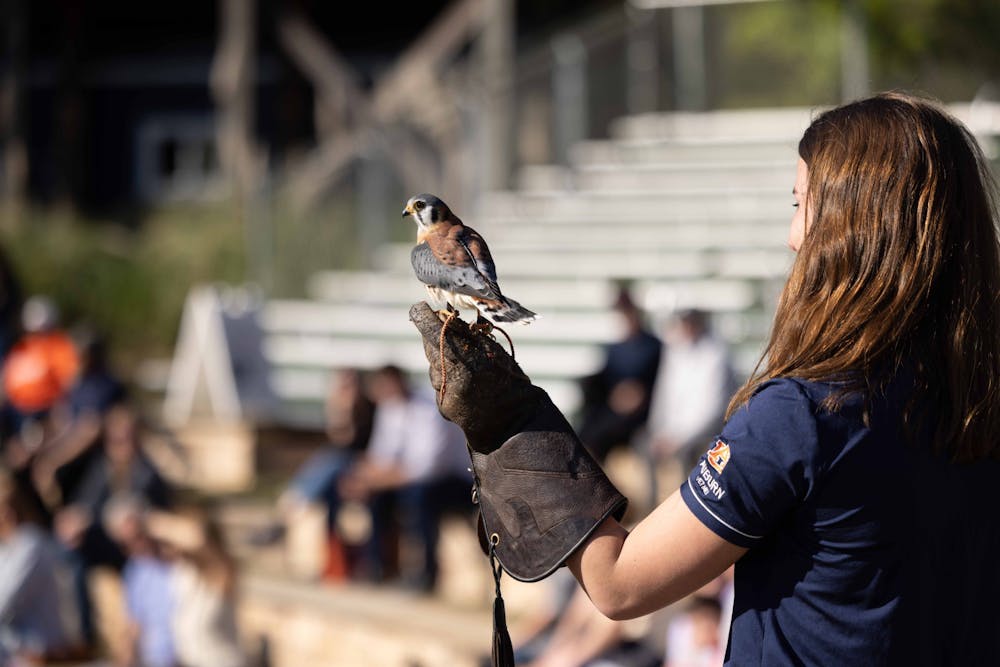
American Kestrel perched on Amanda Sweeney's glove. Photo contributed by Amanda Sweeney.
Marshall Downing, junior in journalism, enjoyed getting to see the birds fly around, getting an up-close view of them after attending the program set before the Auburn vs. Arkansas game. While he came to the event for a class project, Downing said that he ended up enjoying himself, taking a liking to the falcons.
Noah Griffin, senior in wildlife ecology and management and a handler at the Raptor Center, shared that his favorite part of his job is being able to see the smiles on people's faces whenever they come in contact with the birds.
When Griffin became a handler in Jan. 2024, he was initially nervous. After the first few months, Griffin explained he got the hang of it and now enjoys the job and recommends it to those interested.
"If you enjoy it and it's your passion, pursue it and go after it, that's what I did," Griffin said.
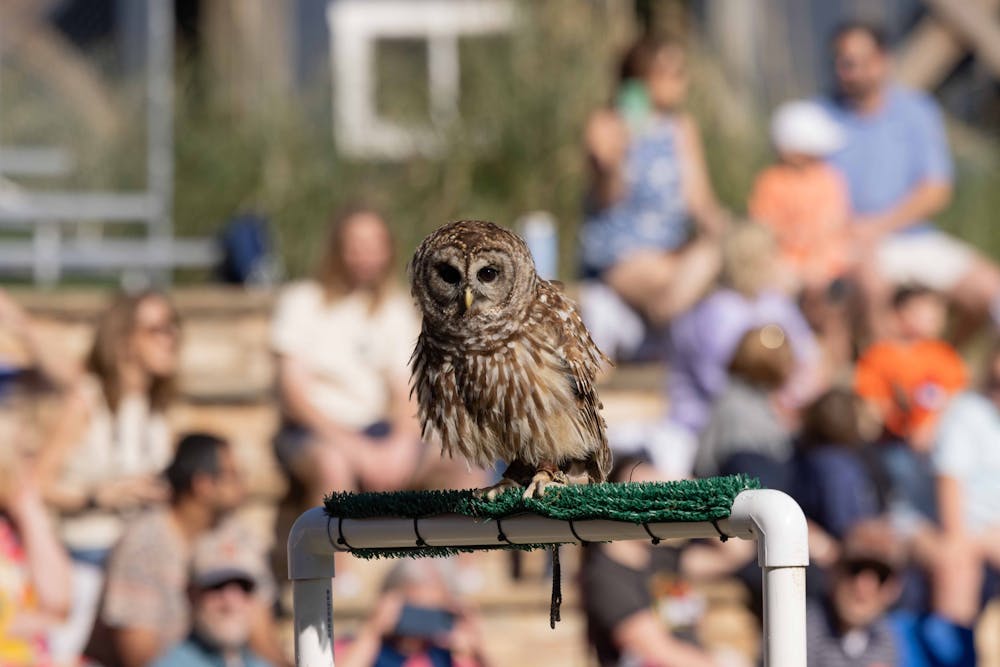
Barred owl resting on perch. Photo contributed by Amanda Sweeney.
Amanda Sweeney, assistant director of raptor training and education, has been handling raptors for 13 years. Sweeney attended Auburn University and majored in animal science where she began as a volunteer at the center which sparked her interest in the raptors.
"I've always enjoyed wildlife, working around animals," Sweeney said. "But when I actually came here as a student, and got that volunteer experience, that's where I really found my passion."
The Raptor Center's rehabilitation center also takes precautions to prevent the birds from imprinting on humans, a process that can occur when an egg is taken from a nest and its parents. Imprinting also can happen when a human is the first thing a baby bird sees instead of its mother. When a bird imprints onto a human, it becomes unreleasable to the wild as its chances of survival are low.
Sweeney shared that ammunition from lead bullets and rat poison are causes that impact raptors, that people may not realize.
Lead bullets and rat poison often unsuspectingly harm raptors, according to Sweeney.
"A lot of things raptors are facing are due to humans, whether that's intentional or people purposefully shooting these birds or things people are purposefully doing but they don't realize the consequences," Sweeney explained.
Sweeney encourages people aiming to protect the raptors to install Kestrel boxes because it gives them an opportunity to lay eggs and start a family. But the best method to aid the birds is to not disturb them during their nesting season.
Sweeney has adapted to the job over the years and overcome nervousness when handling the birds, a skill she teaches the center's volunteers.
"You learn their body language, you learn their behavior, so it really is all about trust-building. It's so important to know that bird. None of my volunteers can work with a bird unless they've been trained on a bird by someone who has already been working on that bird," Sweeney said. "I'm never gonna make a bird be in a situation where it's uncomfortable. If a bird starts showing signs that they are stressed out, they are removed from that situation."
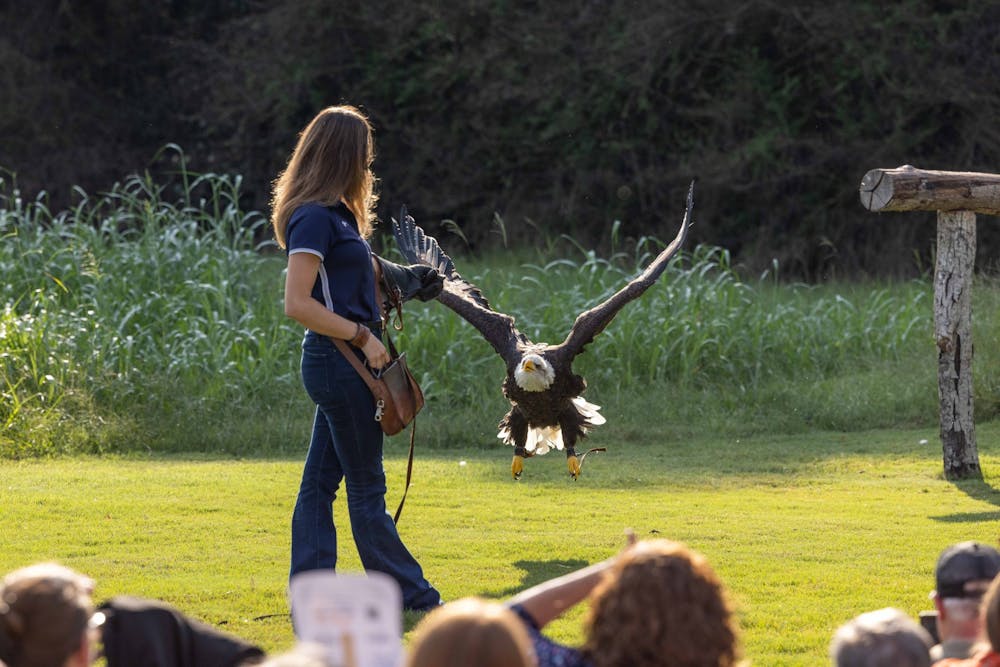
Amanda Sweeney stands proudly beside bald eagle, Independence, as she takes her landing. Photo contributed by Amanda Sweeney.
The center seeks to inspire a passion for raptors, hoping that by fostering a connection between people and the birds, more individuals will want to protect their habitats.
"The education side, our goal is for people to care about these birds, so they want to protect them," Sweeney said. "And by experiencing them up close, they have that connection."
The Raptor Center has two departments that accept volunteers, an education department, which only accepts college students, and a rehabilitation department, which accepts volunteers of all ages.
Sweeney easily recalled her favorite memory at the center: the pregame flight of the bald eagle, Independence. She was set to fly in 2020, but the COVID-19 pandemic halted all Eagle Flights until Auburn's first home game for the 2021 football season.
"She was super ready, when we were able to restart those flights. I remember watching her, she had a really long flight, because then I remembered that I needed to run out there because that was my job. It still brings chills to me and I remember getting a tear as she was soaring around and everyone was cheering because they matter so much to us, but it's also so amazing that they matter so much to the Auburn family, " Sweeney said.
Do you like this story? The Plainsman doesn't accept money from tuition or student fees, and we don't charge a subscription fee. But you can donate to support The Plainsman.

